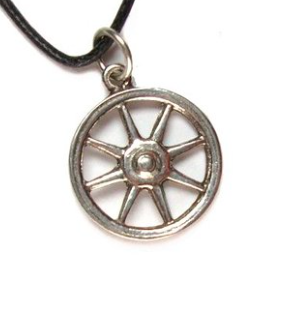I was in an anonymous French village the other day. Someone had mounted a cartwheel, one and a half metres high in a stand, a forlorn reminder of the absence of its fellow and the cart that it was made to pull. The wood was solid, if damaged, its iron rim still intact. It reminded me of a medicine wheel, the Native American spiritual map, echoing the universal symbolism of Four Directions, the Sacred Circle and the Tree of Life as themes of interdependence and duality expressed in the yin yang or taiji symbol. Some might suggest that it is a kind of mandala, a meditation device similar to “walking the labyrinth” in some Christian traditions.
For Native Americans, “medicine” was closely associated with balance, cosmic unity, and finding one’s individual gifts, - or calling, as Christians might say - and thus, is akin to the Eastern concept of karma and 'good medicine' might be translated to mean a 'powerful truth'.
When I was young, I remember reading the I Ching - the Book of Changes, and coming to the realisation that I was a good deal more attuned to the yin or receptive, rather than the active yang - the soft and pliable will defeat the hard and strong, as I was taught in martial arts school all those years ago. As an ex-global vagabond - or nomad - moving through a different stage in life it is as if as the medicine wheel turns it is showing me different patterns, much as the stars change their positions, reassuring constants in cycles of often chaotic change.
People I know have recently returned 'home', a journey which they saw as necessary but for me carried little meaning. In conversation the other day, it became almost painfully clear that in a very primal sense, no matter how far we have travelled and how much we have seen we are shaped by the landscape of our upbringing, by specific events and social engineering as well as our perception of place. But our identity is equally influenced by how we roll the bones or interpret our heritage. In life, as in a game of hazard, skill will make something of the worst of throws. The basic human question Who am I? is not just about self-discovery or finding the 'hero within' but about finding our place in the world. Such a journey may begin in childhood but is by no means restricted to it, indeed Lewis' 'hopeful traveller' is the archetype of a philosophically nomadic lifestyle.
It's not surprising that memoir is such a popular genre. Underlying the angst, trips and missteps that such recollection brings, it represents our search for anchorage, rooted in a half-remembered past. Some good sailors can just let the boat drift, having the courage to wander compassless into an unknown future and in so doing, find a different perspective on the past, since the very subjectivity of examination changes the reality of the experience. Other prefer more stable horizons and consequently may miss out on what Newton once called "standing on giants' shoulders". It's instructive to reflect on the fact that Newton had not plucked this phrase out of the air - it is a quote from the twelfth century French philosopher Bernard of Chartres, hence a perfect metaphor. He was credited with the remark that 'we Moderns are like dwarves perched on the shoulders of giants (the Ancients), and thus we are able to see more and farther than they. And this is not at all because of the acuteness of our sight or the stature of our body, but because we are carried aloft and elevated by the magnitude of the giants.' What a very comforting thought.





